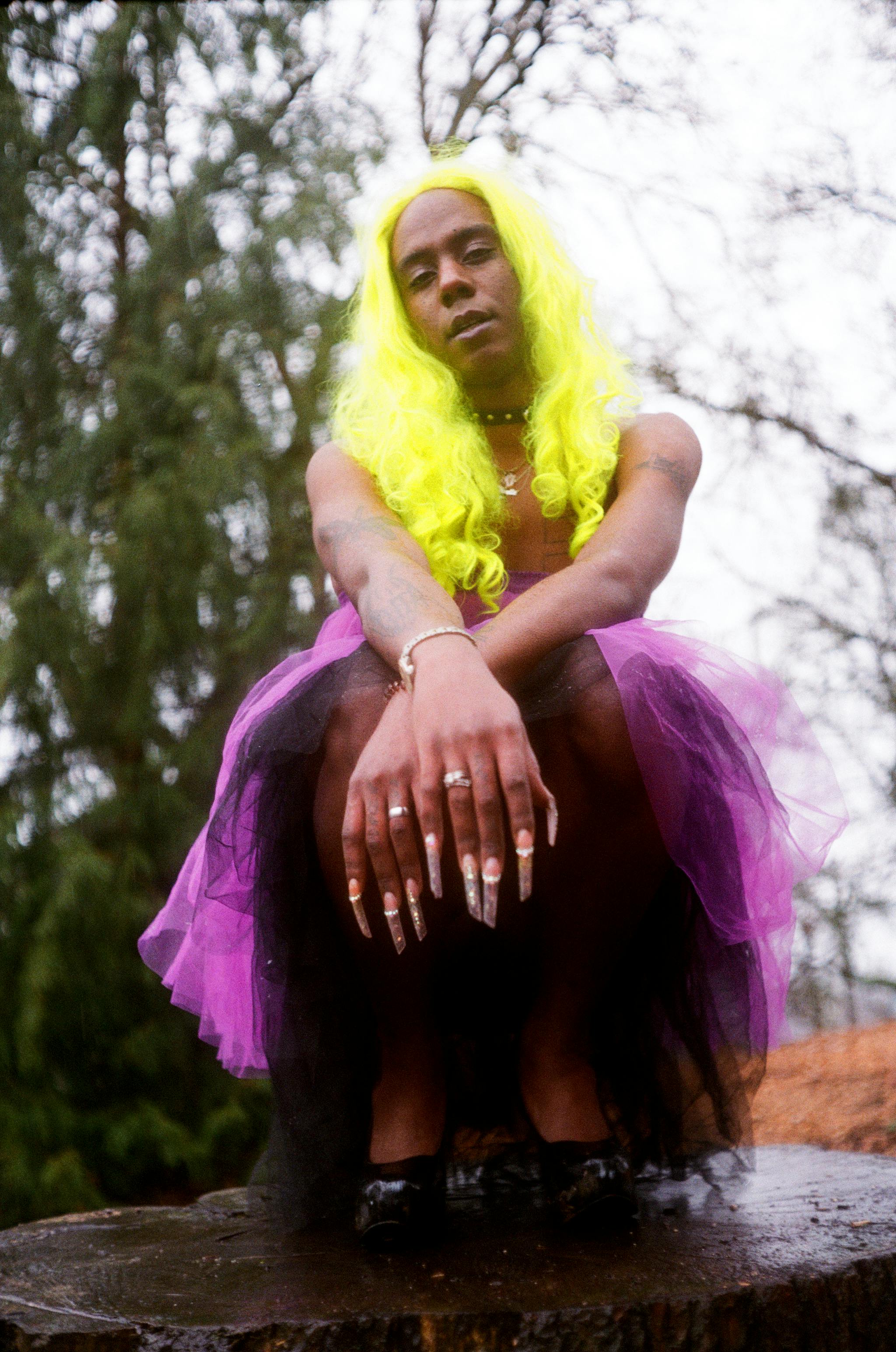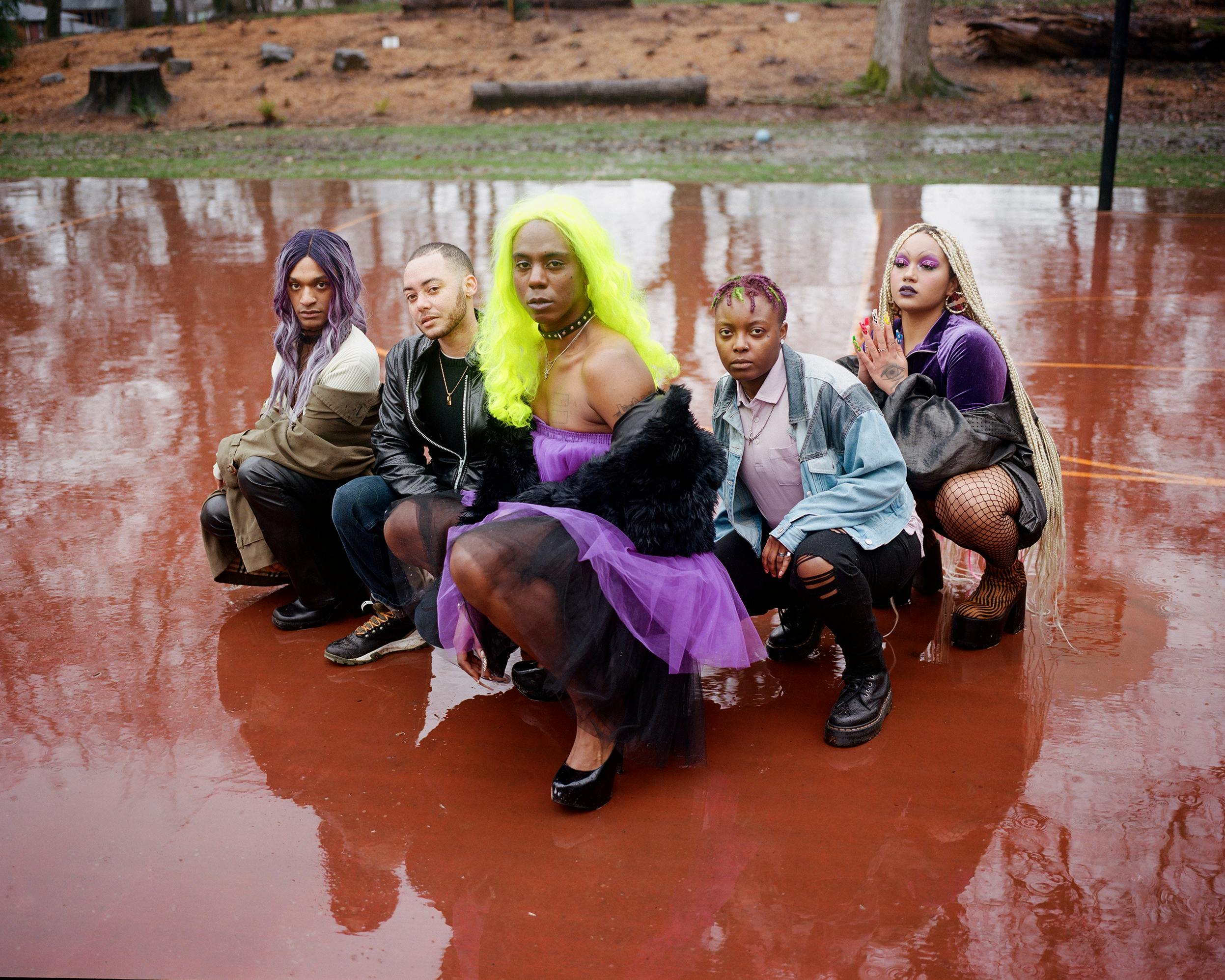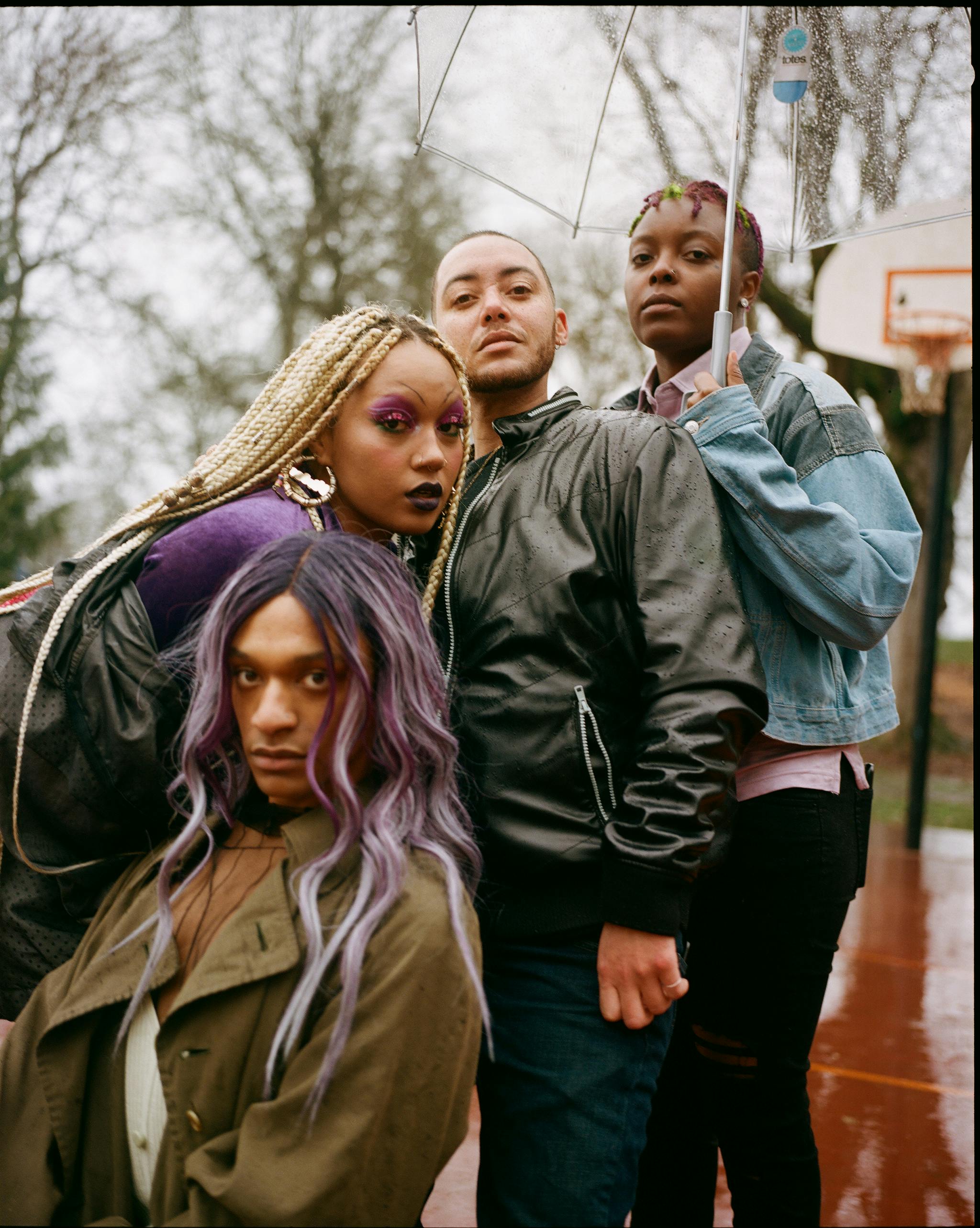
“Of all the girls of college years,/There's one that I've loved long. /For me she wears a golden heart, /For her, I sing this song.”
— Wonderful Sigma Phi Epsilon Girl (Sweetheart Song)
LADY TOURNAMENT
No Master in Motherhood
Photos by
Evan Benally Atwood
Words by
Jazzelle Dodd
Featuring
Tournament Haus
Jazzelle Dodd (Lady Tournament, Mother)
Ernae Windham (Ernae Tournament, Father)
Lucky Frankie (Lenz Tournament, Prince)
Vanté Franklin (Prezéntt Tournament, Princess)
Viv Hamilton (Trouble 007, Heir Apparent)
My first child, I had before I was ready. I found myself in a ballroom family, part of an urgent underground Black & Brown art scene locally. Ballroom houses serve as a makeshift families for queer artists under-resourced by their family & communities. The ballroom scene has its own rituals & lives as a myth. Its history is misrepresented & under-contextualized despite increased visibility, & no one can decide what to do with spectators. My first child was the baby of my original house & within hours of meeting, I claimed them as mine, not even the House Mother could object. After months of growing tensions, I realized I didn’t fit in my first family. I found my function but my place wasn’t respected, my labor wasn’t valued. I’d grown accustomed to being kind of revered by folks I loved. Leaving my first family scared me & the woman I was becoming. I left my first child behind so she could choose family for herself & I swore to her I wouldn’t ever be starting a house & I’d just always be there for her. For months that was true. I was content supporting just her work, I believed it was enough. Then an itch began in my body.
I was raised to be partial to myth. The myths of Christianity, fables of miraculous birth & martyrdom destined. The theater of my own birth: my mother’s labor hours into a late April 1992 Southern California earthquake, the ashes of a city burning after Rodney King’s injustice covering my drying baby clothes. I was raised in a family of faith, that cultivated purpose from the realities they faced daily. My mother, a sharp-shooting pageant queen & ordained religious scholar made our every day meaningful. I never knew myself other than intentional. Despite my parents’ early divorce, I was fortified by the mutual understanding I was meant to be here. How to survive in this reality never quite made sense to me. I didn’t feel “real” growing up.

Being born in the body I was allotted, I was given a myth of boyhood. He was to be great. The gem in a line of praying women & heir to Los Angeles Black Church royalty. I was born of two ministers under the watchful eye of a devoted village. I began boyhood boisterous, bombastically brimming. I can’t remember when I first began to carefully cultivate charisma but I knew I was unable to hide. Openly queer from childhood, I was alleviated from many lasting, though archaic, limitations on masculine performance. I could be a kind of expressive faggot. Couched in my 6’5 Black body, this prismatic persona was made even more unrenderable. I learned I could masquerade in masculine spaces because my sheer size demanded caution. How lucky then for the young flesh thirsty gay, enjoying naively hallow grounds: boy’s locker rooms, straight guys cars, janitors closets after school. I surrounded myself with men not because I identified with them but I need them to make me feel a type of whole.
By the time I got to college, I decided the mythic manhood I was barreling toward needed to include networking with a matrix of men. Fraternity life was rife with myths, embolden by ritual, & scandalized with secrecy. It’s one of the most flagrant theatrical performances of masculinity. Even now I’m hesitant to reveal anything too sacred. We have our Founder’s tale, a group of twelve seminary students trying to bring a new frat to their school. We have our values, virtue, diligence & brotherly love represented by our colors red, gold & purple. We have handshake & songs: Should harm betide me, /Thou ever will guide me, Sigma, Dear Sigma Phi Epsilon True. I was primed for this kind of community. I was conditioned with my extensive study of how men are & an unchecked desire to be needed by them. My fluency made me easy to talk to & early in my time as a pledge I saw how special they needed me to be.
My first role after becoming a brother was serving the Vice President of Recruitment as Social Chair. I helped throw the parties, logistically. I was to manage the guys working their stations, watch out for any liabilities & keep the noise within reason. Moreover, this was the beginning of me being tasked with both caring for the house & bringing in new people. By my junior year, I was Vice President of Recruitment & personally responsible for engaging potential pledges. I had no concept of care as I do now. My only language for persuasion was the flirtation that fortified my place among these earnest liberal-arts troglodytes I fancied so fervently. My recruits signaled a change for the fraternity. Our queer brothers increased, our brothers of color increased. We had more than just econ & comp sci majors. I felt like I was casting new men in roles my older brothers left vacant. There isn’t enough space here to map how my body was a site of experimentation for my older brothers but all these men told me I was special explicitly & otherwise. Facing the young men who came up under my tutelage taught me I wasn’t like the other Black or Queer brothers, I was a singular feature of the fraternity.

Before crossing over into the Brotherhood, older guys in the fraternity solicited me for time & attention. For some, I was this genuine curiosity: a tone of Black they didn’t know & a kinda queer that didn’t quite fit. For others, I was the material manifestation of magical negro necessity they’ve only dreamed of. I’m only so retroactively responsible but at the time I convinced myself all violence was self-inflicted cause I wanted them so damn bad. There was more causality than conspiracy in what I catered for the brothers, so I was passed around by all secretly to siphon whatever salacious or sage sensation they sought.
My senior spring, with my Vice President term complete, I was selected to be a pledge trainer (locally we called each other pledge masters) over a prime group of about 15 boys. This was the first time however, I was actually in a role of mentorship. Ever. Even with the parameters & absurdity of the pact, I saw the responsibility as paramount to my manhood at the time. I, along with 3 other Senior Brothers, embarked on the semester-long journey & I don’t think it took a week for those boys to start calling me “Mom”. Many a weeknight I had a counsel of boys passing around bongs & beers in my room. I heard childhood stories never before shared, wishes they can’t tell their girlfriends, the lies they told their mothers & themselves. More than the parties, the social capital, or the cloak of brotherhood, I found the most comfort caring for my pledges. I had been in dance groups, acapella clubs, theater productions, but here among them did I first feel real.
Upon graduation, living only minutes from my alma mater, I had to actively take time away from visiting the campus, keeping tabs on my boys. For the Fall after I graduated I visited my boys about twice a month before finally committing to my new life. Postgraduate life was a blur of flailing past the point I planned to live & deciding art was my calling. I tried activism. I tried mentoring youth poets. I was a drunk who didn’t believe I was living for much now years away from the last world I felt useful. The years following college were a trek into a wilderness, I was eulogizing the boyhood I barely survived. I began untangling the definitions of self in proximity to men. I saw how even queer expressions of masculinity failed to bring me security. Beginning life as a trans woman I returned to my home state of California & admit to my own alcoholism.

In the first year of my sobriety, I moved to Portland & began collaborating with local Black artists, curators, & spaces. I found sociality & new kinds of community that affirmed me as real. I had tamed my insatiable taste for being surrounded by “men”, with their mythic promise of security. It took months to re-center myself & invest in the Ballroom scene at large, but still, I ached for a place to fit. I had my creative & professional accomplishments from my time across the country but here in my home, I wanted to be known within a family.
My hormone therapy, about 6 months in at that point, had severely shifted my mood & my wellness baseline was raised. I found a new softness in everything. It was then I first imagined motherhood. I had jokingly begun claiming some young Black artists in town but wondered what if I did so with intention? I didn’t want my house to look like a team though, nor a fraternity. After asking my closest guy friend to be the Father, I felt poised to gestate a collective under my care. We had the myth of ballroom families readily available to us. I have two more children now & it’s not lost on me the vaguely nuclear quality to our structure.I jokingly call my first child (from my previous relationship) when telling my friends about my family.
I find myself mythologizing my history to my children often. I try to not over-romanticize how I got over & the never-ending nature of getting through this life. What’s left of my childhood faith I pass on in cautionary tales & demand for higher pay rates. I worry my narcissism fuels my motherhood, each of my children’s faces remind me of a favorite self. But they each tell me how specifically they fit into our unit & how I impact their worlds. I can’t always believe I was the best influence over my pledges but I believe I gave them another way to be in the world. They practiced me to be patient & possible for the earnest & every day. The realness I sought since childhood, I now know is the womanhood I am living in now. The mother/girlfriend/sister placeholder I served for those boys recognized a self I was yet to fully embody. Now, as a woman, I actively seek ways to be the best mother. It’s a realness I fashion from a boyhood that pledged to be more than the myth of a man.
